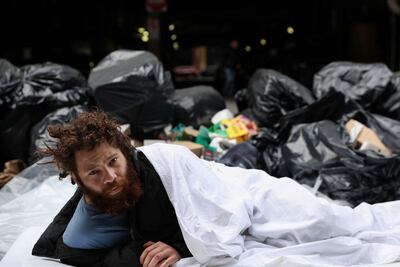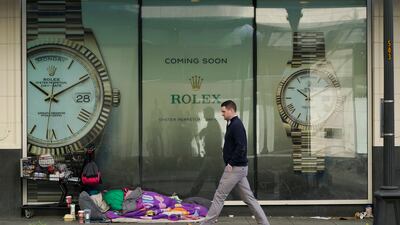Last week the New York Times published a powerful and painful essay following the footsteps of Abdul Curry, homeless man in San Diego fighting to stay alive. His daily routine – living out of a shopping cart, taking care of his friends who were dying on the street, searching for food, being constantly wet and hungry and cold – was beyond heartbreaking.
It is “the most dangerous time in modern history to be homeless in America,” the article went on to say. The number of homeless people dying in San Diego, but also Phoenix, Denver, Austin, and Seattle has gone up 10 times in the past decade. There are more than half a million homeless people in the US, which is roughly 18 out of every 10,000 people. Covenant House, an American non-profit organisation, estimates that 4.2 million children, youth and teenagers are homeless.
The article was published on the back of the murder earlier this month of Jordan Neeley, a 30-year-old mentally ill homeless man in New York City. Mr Neeley died when a former marine pushed him to the ground on a subway car in a chokehold while other passengers held Mr Neeley down and watched.

What do we know about Mr Neeley’s short and painful life? We know that he was a former Michael Jackson impersonator. As a teenager, his mother was murdered. Shortly after, left alone, his descent into mental illness was rapid. Yet no one helped him. After he died, it was revealed that ironically, Mr Neeley was considered one of New York City’s most high risk – in the top 50 – homeless people. Yet he was not saved.
I read the stories of both Mr Neeley and Mr Curry’s lives with tears running down my face. It is painful to understand how the most vulnerable in our community are left so forsaken. The US has the highest GDP and is the wealthiest economy in the world. America has 735 billionaires – more than any other country in the world, just ahead of China. How can we allow this to happen?

One reason for homeless deaths rising is fentanyl, the synthetic opioid drug used as pain relief that is approved by the Federal Drug Administration. It is 100 times more potent than morphine. Fentanyl is currently the highest cause of death for Americans under 50, even higher than heart disease. Mr Curry recounts watching his homeless friends die. He himself has overdosed five times and keeps testing strips nearby for his friends. He is skilled at giving CPR. Life outside for him means a terrible cycle of chronic fatigue, alcoholism, malnutrition, depression, anxiety, paranoia and constant discomfort.
What drives someone to the street? If you pass someone who is homeless, ask them. Most people can’t meet the eyes of a homeless person, seeing them as subhuman and invisible. But most have a story to tell about falling through the cracks, feeling utterly unprotected.
If you ask why they aren’t in shelters, they will often tell you they fear getting sexually abused, robbed or beaten. If you ask when they last ate, some will say days. If you ask if there is someone you can call to help them, most will say there is no one. Many on the Bowery where I used to live told me they were former veterans of wars stretching from Vietnam to Iraq and Afghanistan. The feelings of abandonment, shame and desolation are enormous.

Across the US, homelessness is rising. Many cities, such as Phoenix, are clearing encampments where people try to make their temporary homes. Rents in cities like New York or San Francisco are exorbitant and many lost Covid-19 benefits or housing voucher benefits that many used to move out of shelters and into their own homes. Mayor Eric Adams, who is tough on homeless people, last summer said NYC was at a “breaking point” as it struggled to provide for homeless and also recent migrants who had been housed in midtown hotels.
What are some viable solutions to the homeless epidemic? Homelessness is a cycle of desperation. Without a home, you can’t find a job. But you can’t find a home if you have a police record. Many have records because they are on the streets and get busted for drug or petty offences. The National Alliance to End Homelessness calls for “Community-wide co-ordinated approaches” meaning creating systems and programmes that work, rather than individual city programmes which usually fail.
Co-ordinated programmes can help people move through the system faster. Often programmes are mired in bureaucracy or paperwork that homeless people simply cannot provide. Rapid rehousing – helping people find housing quickly – can be offered without preconditions (prison records, credit checks, sobriety). The argument is that getting people into a home, which crucially increases self-esteem, is a first step that then allows them to conquer other challenges and they can then search for employment.
Above all, we need assistance for the most vulnerable in our community. We need to get people off the streets who need to be in care homes, or need psychiatric evaluations and care, such as Jordan Neeley.
What can an ordinary person do to help alleviate homelessness? Don’t just walk past someone. You can buy them food or push their wheelchair to a safe place. You can talk to them and ask them what happened to them. You can try to bring them to a shelter if they are willing. You can volunteer at a shelter, taking an evening or overnight shift, and if you can’t do that, you can chop vegetables at a soup kitchen. You can collect warm clothes from friends and colleagues and distribute or bring direct to a shelter. You can try to find employment for those who are able to work.
But most of all, don’t look away. It’s so much easier to forget that people like Jordan Neeley or Abdul Curry are human beings. That they were born, had mothers, had fathers, and once had lives that functioned. As their brothers and sisters, it is our most fundamental mission to not abandon them.


